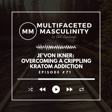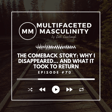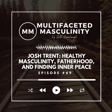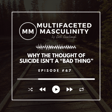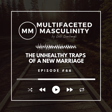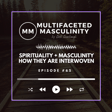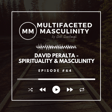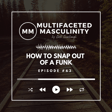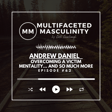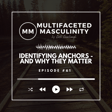Become a Creator today!Start creating today - Share your story with the world!
Start for free
00:00:00
00:00:01

How to Identify and Remove Your Inner Victim | Ep #36
We all have this inner voice that tries to give us an out from taking responsibility, confronting our shortcomings, and embracing our greatness... it's our inner victim mentality... better known as our "inner bitch".
The challenge comes when we try to identify the voice because it is largely driven by our subconscious.
That can change today if you're willing to confront it. We will dive into what exactly is your inner victim, how to identify the areas of your life it is steering the ship, and how to change the cycle of dependency you've built.
URL's
Host: JoshCearbaugh.com
Podcast: MultifacetedMasculinity.com
12 Week Course: Jumpstartyourlife.com
Free 15 Minute Consultation: Click Here
Transcript
The Impact of Divorce on Self-Discovery
00:00:00
Speaker
me it was the areas that my ex was in my god spot she was my everything in an unhealthy way or she was my excuse or my reason to not pursue something or take ownership in certain ways so one of the gifts one of the good that came from
00:00:19
Speaker
My divorce was realizing, okay, that excuse is now gone. That version of God in my heart is now gone. So because of that, who is God to me in these certain areas of my heart that she was my God? What does my identity actually look like as a man when parts of my identity were wrapped up in, I'm a married man.
Understanding and Overcoming Victim Mentality
00:00:47
Speaker
Now, I'm not saying that you need to get a divorce to find those answers, but for me, that was some of the good that came from getting a divorce, something that was bad, something that was negative. But the victim mindset, it blocks your ability to see that, to find it. Now, please hear me on this. My heart is not for you to just all of a sudden say, well, let's just find the good in everything. Because if I acknowledge the bad, then I'm just being a victim. It's not that at all.
00:01:17
Speaker
It's where are you letting your heart and your mind and your internal paradigm put its attention, its energy and its focus. If it's the things that happened to you cannot transition to happen for you, then you are catering to your inner victim, no matter what the circumstances. And for some of us,
00:01:38
Speaker
Learning to identify and change that victim mentality, it takes time. It's not easy to do by any stretch of the imagination. For me, a victim mentality was what was modeled to me from my dad for a big chunk of my childhood and my life. It was that he could not
00:02:00
Speaker
take ownership or he couldn't transition to saying, you know what, I need to take responsibility in these areas or life is happening for me. My dad couldn't flip that switch to the degree where it was probably about five years ago and I was sitting down having lunch with him and we were working through
00:02:23
Speaker
this very topic. And I'll never forget this in our conversation, but I just remember saying to my dad, you know, dad, just as a grown man, it really makes me sad to see my dad be a victim to life instead of be proactive and model healthy masculinity.
00:02:46
Speaker
I'm not mad at you for it. I'm not disappointed in you for it. It just makes me sad. And it did hurt to have to find those things for myself because it wasn't modeled to me. And he put down his lunch and he said, Josh, but I am a victim. And the reality is,
00:03:03
Speaker
The most I can hope for in life is to surround myself with people who are enjoying their life and vicariously live through them. That was the response that I got. And that's a whole other episode and conversation on learning to love and receive love from your dad in a healthy way to the degree and the capacity
00:03:24
Speaker
that he's able to give or to receive. A whole different topic, but specific for the victim mentality, he had so bought into, this is my reality, that he genuinely couldn't find another way to live life and enjoy it than to be around other people who did. That's what a victim mentality will get you in the long run.
00:03:47
Speaker
It will literally be the thief in the night that steals the joy from your life and causes you to wake up as an older man living in a place of regret, living in a place of self-doubt, living in a place of self-hatred, living in a place of being a victim. The thing is, for a lot of us, our inner victim lies within our subconscious. It's not something that
00:04:17
Speaker
Someone who has a victim mentality runs around and goes, you know what? I am acutely aware that I'm making excuses right now and I'm blaming the other person and I don't
Exercises for Recognizing and Changing Victim Mentality
00:04:27
Speaker
care. This is me being a victim and I feel really good about it. Oh, of course not. You don't feel good about being a victim in the long run. Feels really good in the moment. It gives you a way of having an out
00:04:41
Speaker
to taking ownership or responsibility or changing your lens to find the good, whatever it may be. It gives you an out. So it feels good in the moment, but in the long run, it eats away at you. So the first thing you have to do to change that is to realize where in your life has that victim mentality been present? How long have you had it? Where did you learn it? How did you first identify with it? Why did it keep you safe?
00:05:10
Speaker
That's a big one for a lot of us. Our victim mentality made us feel safe in a moment. We all want to gravitate to that sense of security, even if it's a false sense of security. So in essence, you have to first bring the subconscious victim mentality that you have within to your conscious.
00:05:29
Speaker
to be able to begin to learn and identify where it is so that you can then do something about it. Now, for the second half of this podcast episode specifically, I'm going to be rattling off 25 questions. And these are questions where, you know, if you're able to, ideally you want to be sitting somewhere where you can write down the question, actually write down the question itself with your dominant hand,
00:05:56
Speaker
And then write down the answer that you hear immediately with your non-dominant hand. And what this is, is it's an exercise in helping you bring your subconscious to your conscious to help you identify with it, relate to it, expose it so that you can begin to change it. So you want to have, whether it's your notes on your phone or a notepad or a journal.
00:06:21
Speaker
your email system, whatever it may be for you to be able to do it. Ideally, in the best case scenario, you want to actually use paper and pen. Why? Because if you're writing out the question with your dominant hand, immediately writing out the answer with no hesitation, just the very, very first thing that comes to mind with your left hand. What you're doing is you're focusing on your non. Well, I'm right handed, so my non dominant is my left hand, but your non dominant hand.
00:06:50
Speaker
In our mind, we are focused on writing the word because it's not our dominant and it helps you let go of your default response or your default answer and helps you find what this subconscious inner victim answer actually is. So go ahead and pause this. And if you're exercising or driving or whatever, come back to the save this episode, download this episode, circle back to it and do this exercise.
00:07:19
Speaker
So what we wanna do first is go ahead and close your eyes, put your hand on your heart, and repeat after me. Heart, I give you permission to be fully present right now. Now from this place, I want you to write down the question
00:07:48
Speaker
And if you can't do that, then just write down the answer in whatever form you can. But this is specific to your victim mentality. Intervictim, where did we first meet?
00:08:15
Speaker
When did you first come into my life? How do you influence me? What do I least like about you? Which opportunities in my life today are connected to your energy?
00:08:50
Speaker
Who are you most connected to that is in my life? How has this connection contributed to our spiritual development? Is there any way that you help me serve other people? If so, what?
00:09:23
Speaker
Who in my life do I associate with your power? Who are you connected with from my past that I still have unfinished business with? In what way can your influence help bring closure
00:09:50
Speaker
each of those relationships. How do I know when your energy is influencing my thoughts or my actions? Do you show yourself through my dreams?
00:10:26
Speaker
In what ways does your influence enhance a false sense of personal power? Do you have a negative influence on my self-esteem or my behavior or my attitudes? What have I learned lately that comes directly from you?
00:10:58
Speaker
When and where in my life have you communicated the most directly with me? What do you make me afraid of? Are there any positive characteristics that I have that you enhance or help me with?
00:11:30
Speaker
What is your central contribution to my spiritual development? What are the most important personal lessons that you have taught me? Is there an immediate guidance that you can give me in this present moment?
00:12:00
Speaker
What is the most immediate personal change connected to your influence that I can make that would best empower me at this point in my life? What do I fear most about your influence in my life?
00:12:36
Speaker
What characteristic or energy should I lean into in place of you in my life?
Embracing Authenticity and Personal Growth
00:12:52
Speaker
Okay. So those are the 25 questions that hopefully you had a chance to run through. Ask yourself honestly. And for some of them, if you don't get an answer right away, that's okay. The whole point of this exercise is really to just.
00:13:08
Speaker
help you, again, bring your subconscious to your conscious. And sometimes, all you need is that. All you need is to begin to realize how integrated into your life your victim mentality is, your inner victim is, to begin to change it, to begin to pivot away from that response.
00:13:31
Speaker
So be aware, if you did this exercise, be aware in the next, let's say, couple days or week, give yourself a challenge of really revisiting this. And then throughout the day, begin to notice, are my reactions from a place of my inner victim or are they from a place of strength? Are they from a place of the true me, the person that I know to be? Because you can exchange that inner victim
00:13:59
Speaker
with what I call your inner king, your true you, your authentic self, whatever you may want to call it. It's that badass man that God has created that is not a victim. And like I said, I still fight this.
00:14:13
Speaker
Last week when I was feeling trapped by this and by circumstances and lack of momentum in certain areas of my life, what I did was I sat down because I've done this exercise already a few times and I know when that inner victim is rearing his head. And so then what do I do? Well, what I did was crack open my journal and I began to write out all of the things that I have been doing over the last six months.
00:14:43
Speaker
that a victim would not do. And I just started to rattle them all off. A victim would not be proactive in his physical health the way that I have been and consistent with either walking or riding his bike. A victim
00:14:58
Speaker
would not have removed certain things in his food and his diet to begin to feel better. A victim would not have been proactive and reached out to these people and built relationship. A victim would not have launched a podcast on masculinity. A victim would not have, and you just, I'm just going down that list of going, see, this is a reminder of who I actually am, not my inner victim.
00:15:27
Speaker
Our inner victim doesn't have to define us and sure as hell doesn't have to control us, but it is our responsibility to identify where it is dictating and guiding our life and to see it for what it is and lovingly transition it from
00:15:44
Speaker
that inner victim to that truest sense of who you are. The reason why I say lovingly is because you can let your pendulum swing to, oh, I hate my inner victim. That's a part of who you are. So if you hate that part of you, then you're flying in the face of learning how to embrace all of who you are.
00:16:04
Speaker
and all of who you are is who you are meant to be. The good and the bad. It's what makes you unique. It's what makes you amazing. It's what makes you strong. It makes you stand out. It's what makes the woman that you fell in love with attracted to you. All of that.
00:16:19
Speaker
Not just the good parts, not the parts you want to put on display for others, but all of it. So if you begin to hate your inner victim, then you're falling back into that trap of just trying to emotionally abuse yourself into health. That is going to temporarily maybe help you get out of bed earlier in the morning, but it's sustainably. But long-term, it's not sustainable. So begin to confront your inner victim.
00:16:42
Speaker
but not abuse your inner victim. Begin to expose your inner victim, but expose it for the sake of letting it be seen for what it is and to transition and pivot
00:16:54
Speaker
Get from that victim to the strongest version of yourself who can be present, who can do hard things, who can be empathetic and compassionate and loving and kind and strong and unshaken. We can be all of those at the same time, but it's really hard to see them, access them, or own them if we're stuck in a victim mentality.
